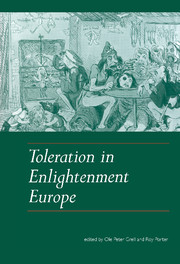Book contents
- Frontmatter
- Contents
- List of contributors
- Preface
- 1 Toleration in Enlightenment Europe
- 2 Toleration and the Enlightenment Movement
- 3 Multiculturalism and Ethnic Cleansing in the Enlightenment
- 4 Intolerance, the Virtue of Princes and Radicals
- 5 Spinoza, Locke and the Enlightenment Battle for Toleration
- 6 Toleration and Enlightenment in the Dutch Republic
- 7 Toleration and Citizenship in Enlightenment England: John Toland and the Naturalization of the Jews, 1714–1753
- 8 Citizenship and Religious Toleration in France
- 9 A Tolerant Society? Religious Toleration in the Holy Roman Empire, 1648–1806
- 10 Enlightenment in the Habsburg Monarchy: History of a Belated and Short-Lived Phenomenon
- 11 Toleration in Eastern Europe: the Dissident Question in Eighteenth-Century Poland–Lithuania
- 12 Toleration in Enlightenment Italy
- 13 Inquisition, Tolerance and Liberty in Eighteenth-Century Spain
- Index
12 - Toleration in Enlightenment Italy
Published online by Cambridge University Press: 03 February 2010
- Frontmatter
- Contents
- List of contributors
- Preface
- 1 Toleration in Enlightenment Europe
- 2 Toleration and the Enlightenment Movement
- 3 Multiculturalism and Ethnic Cleansing in the Enlightenment
- 4 Intolerance, the Virtue of Princes and Radicals
- 5 Spinoza, Locke and the Enlightenment Battle for Toleration
- 6 Toleration and Enlightenment in the Dutch Republic
- 7 Toleration and Citizenship in Enlightenment England: John Toland and the Naturalization of the Jews, 1714–1753
- 8 Citizenship and Religious Toleration in France
- 9 A Tolerant Society? Religious Toleration in the Holy Roman Empire, 1648–1806
- 10 Enlightenment in the Habsburg Monarchy: History of a Belated and Short-Lived Phenomenon
- 11 Toleration in Eastern Europe: the Dissident Question in Eighteenth-Century Poland–Lithuania
- 12 Toleration in Enlightenment Italy
- 13 Inquisition, Tolerance and Liberty in Eighteenth-Century Spain
- Index
Summary
In 1789, on the eve of the French Revolution, Tommaso Vincenzo Pani published a defence of the Inquisition entitled On the Punishment of Heretics. Pani was a Dominican; in 1789, he was employed as Inquisitor in the city and diocese of Faenza in the Papal States. His book was designed to show that without an active Inquisition, the survival of the Catholic faith would be put at risk, and the established political and social order would collapse. At one point, he takes a swipe at the writers who had criticized the work of the Inquisition at the time, referring to the ‘ridiculous innovators and the philosophers who lack all judgement, the fashionable scholars and the ignorant politicians who, with their idle talk and their lies, without authority and reason do all they can to discredit the tribunal of the faith’.
Pani no doubt considered that the events of the following few years in France amply corroborated his argument, and in 1795, he published an expanded second edition of his book. Just over 200 years later, we in our turn might be inclined to view the publication and republication of such a text as evidence that intellectual life in Italy at the end of the eighteenth century was still significantly affected by the threat of censorship and persecution. Certainly, there were Italians throughout the century who complained of the threat posed by the Inquisition. In 1715, for example, Paolo Alessandro Maffei observed that in Rome, ‘anyone who becomes known as a scholar immediately earns the title and reputation of (a heretic)’.
- Type
- Chapter
- Information
- Toleration in Enlightenment Europe , pp. 230 - 249Publisher: Cambridge University PressPrint publication year: 1999



